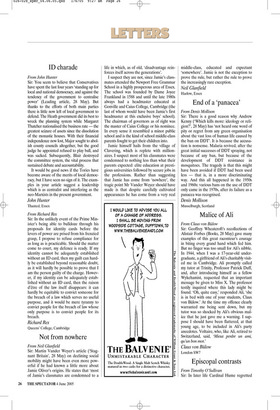middle-class, educated and expectant ‘somewhere’. Jamie is not the exception
to prove the rule, but rather the rule to prove the increasingly rare exception.
Neil Glanfield
Harlow, Essex
End of a ‘panacea’
From Denis Mollison Sir: There is a good reason why Andrew Kenny (‘Which kills more: ideology or religion?’, 28 May) has ‘not heard one word of pity or regret from any green organisation about the vast loss of human life caused by the ban on DDT’. It is because the accusation is nonsense. Malaria revived, after the great initial successes of DDT spraying, not because of any ban, but because of the development of DDT resistance in mosquitoes. The tragedy is that this might have been avoided if DDT had been used less — that is, in a more discriminating way. And this all happened in the 1950s and 1960s: various bans on the use of DDT only came in the 1970s, after its failure as a panacea was recognised.
Denis Mollison
Musselburgh, Scotland
Malice of Ali
From Claus von Bilow Sir: Geoffrey Wheatcroft’s recollections of Alistair Forbes (Books, 28 May) gave many examples of this great raconteur’s courage in biting every grand hand which fed him. But no finger was too small for Ali’s nibble. In 1944, when I was a 17-year-old undergraduate, a girlfriend of Ali’s charitably visited me in Cambridge. Ali promptly called my tutor at Trinity, Professor Patrick Duff, and, after introducing himself as a fellow Wykehamist, requested that an important message be given to Miss X. The professor testily inquired where this lady might be found. ‘Oh, quite easy,’ responded Ali, ‘she is in bed with one of your students, Claus von Bülow.’ At the time my offence clearly warranted me being sent down, but my tutor was so shocked by Ali’s obvious malice that he just gave me a warning. I suppose I should have been flattered, at that young age, to be included in Ali’s party anecdotes. Voltaire, who, like Ali, retired to Switzerland, said, ‘Mieux perdre un ami, qu’un bon mot.’ Claus von Bilow
London SW7


















































 Previous page
Previous page